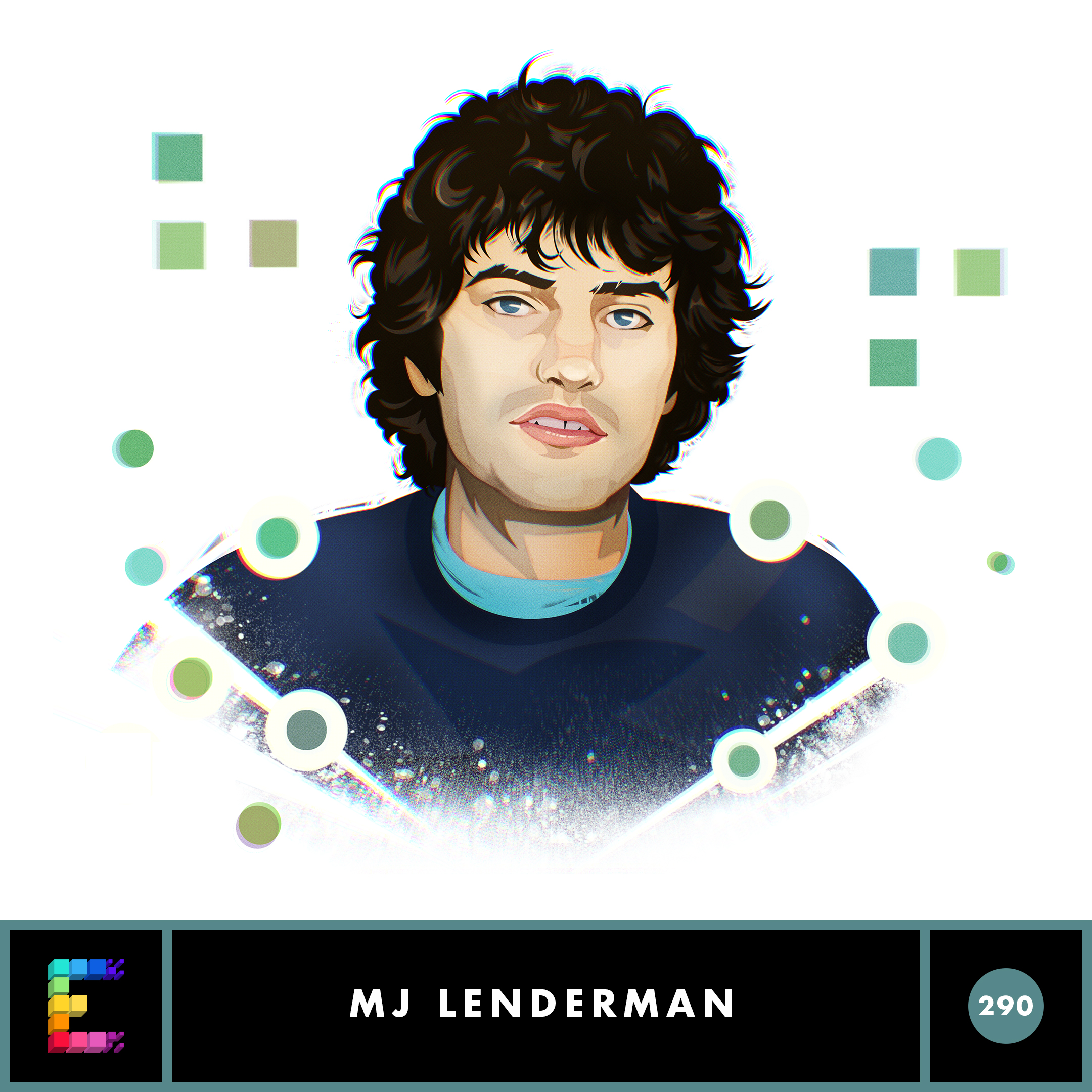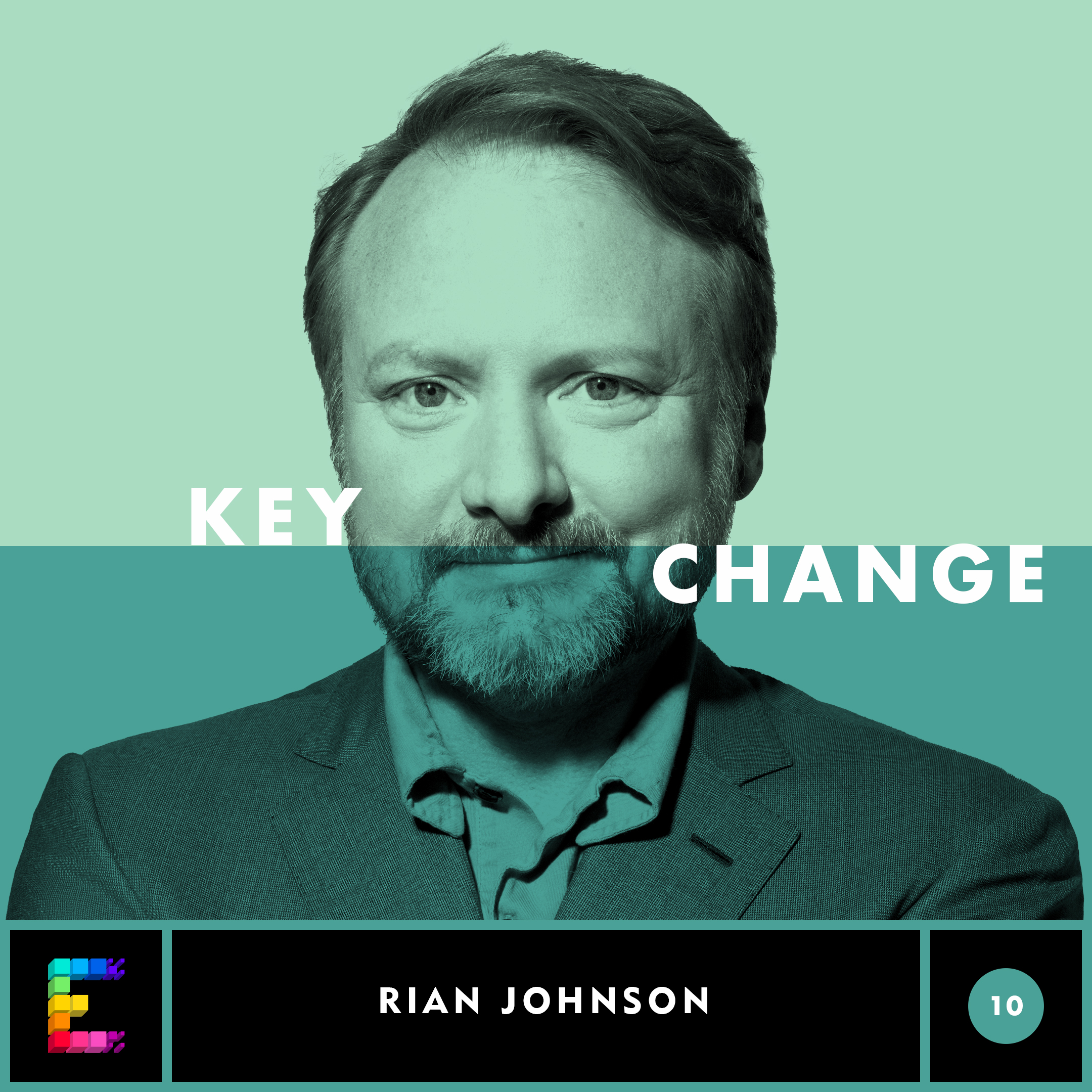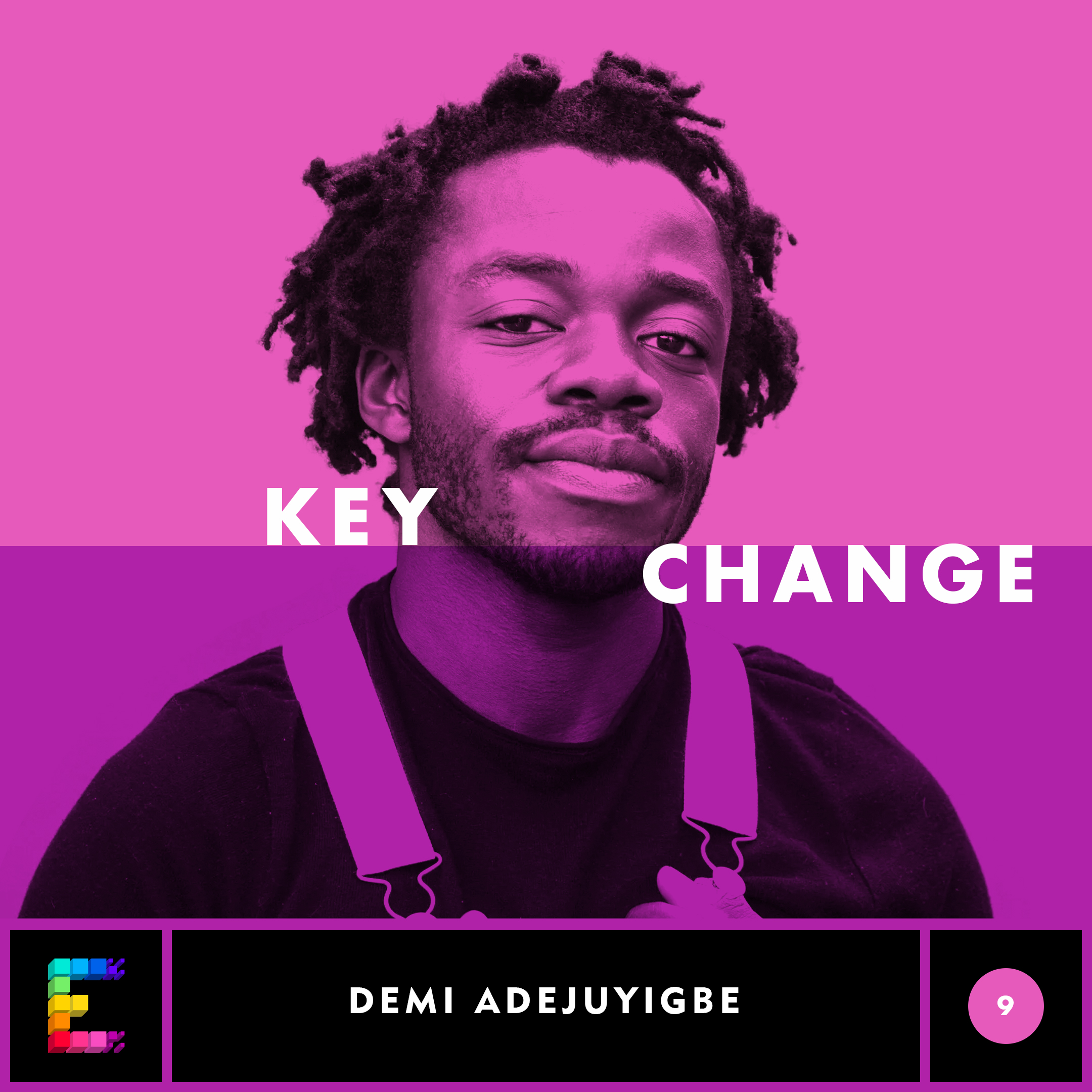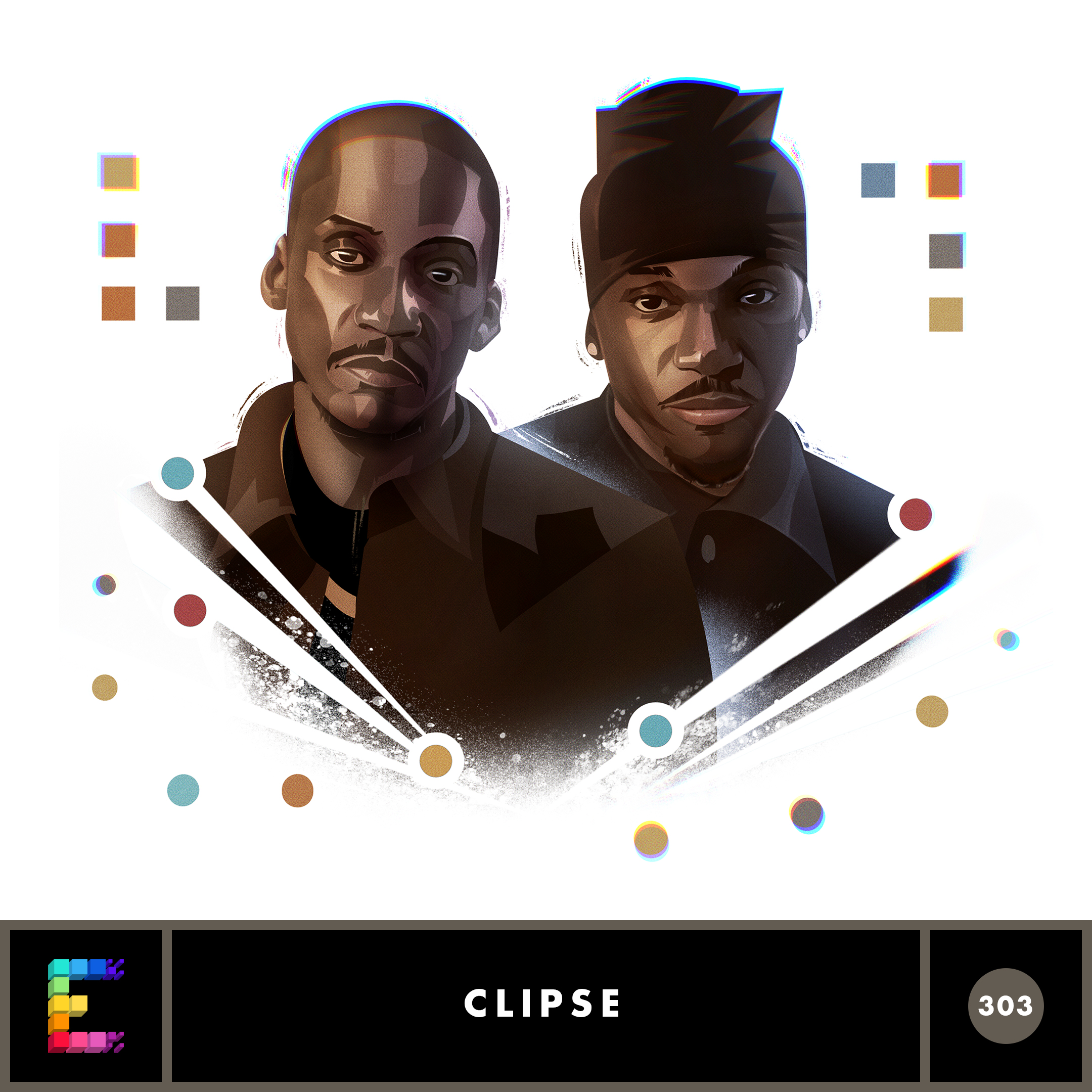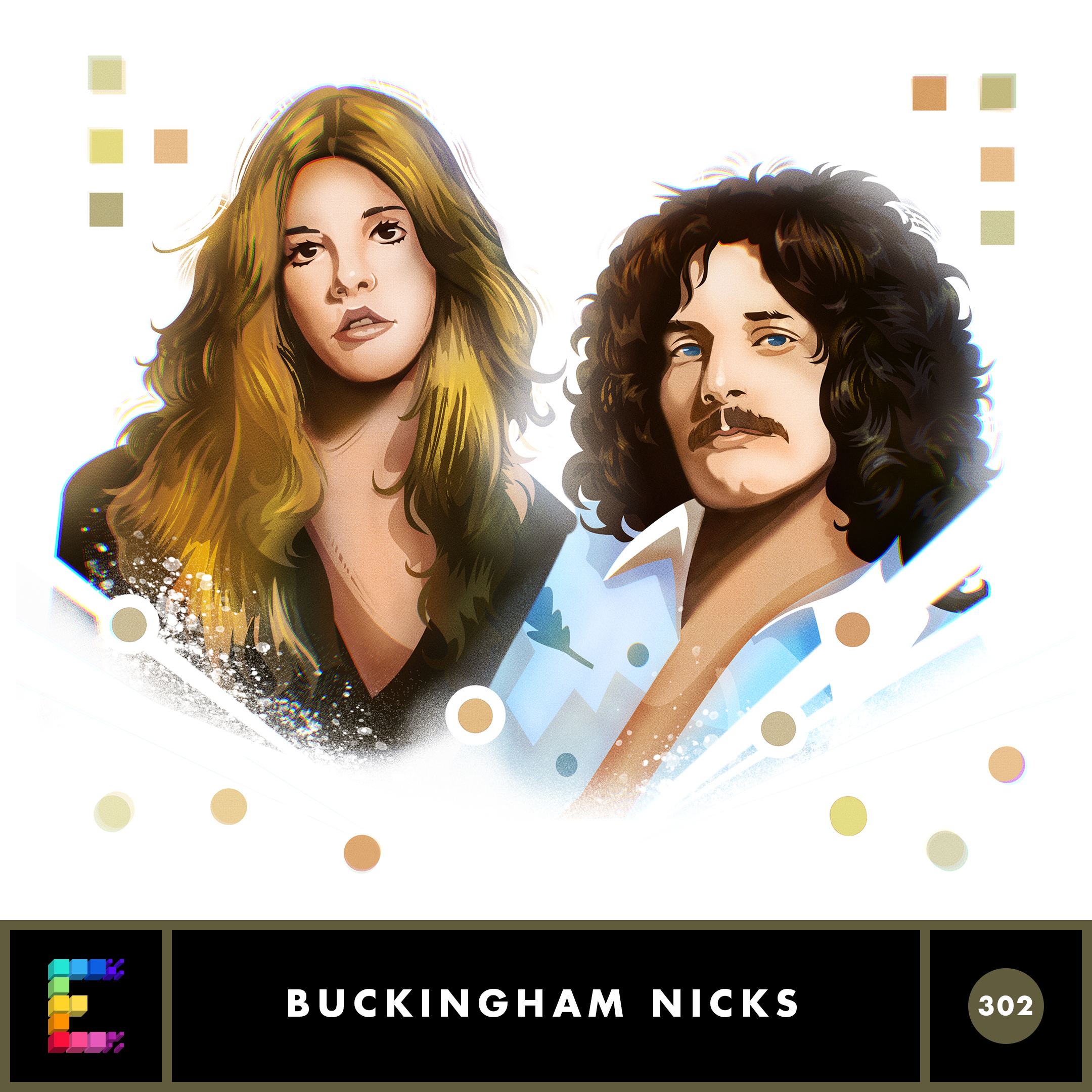MJ Lenderman - You Don't Know The Shape I'm In
Jake Lenderman plays and records under the name MJ Lenderman. He put out his first album in 2019. In addition to his solo work, he’s been a member of the band Wednesday, and he’s also featured on the Waxahatchee hit song “Right Back to It." In September 2024, the fourth MJ Lenderman album came out. It’s called Manning Fireworks. The New Yorker named it the best album of the year, and Stereogum, Rolling Stone and Pitchfork all put it in their top ten. For this episode, I talked to Jake about one of the songs from that album, called “You Don’t Know the Shape I’m In.” The song itself took shape in a few different ways. Coming up, you’ll hear the way the song started as a demo, and then how that got fleshed out, and then how it got rebuilt, and then how Jake completely reimagined the whole thing.
For more info, visit songexploder.net/mj-lenderman.
Press play and read along
Transcript
Speaker 1 You're listening to Song Exploder, where musicians take apart their songs and piece by piece tell the story of how they were made. I'm Rishikesh, Hirway.
Speaker 1 So I just wanted to say a couple words about how this show works. Song Exploder is part of Radiotopia, which is a group of independent podcasts.
Speaker 1 And if you look around these days, independence is becoming more and more rare.
Speaker 1 Everything from record labels to movies to newspapers, everything is getting consolidated and controlled by a small number of corporations.
Speaker 1 To me, one of the tragedies of this means you get less original, weird, unexpected, and creative stuff out in the world.
Speaker 1 And this podcast is all about celebrating the surprising ways that creativity gets manifested. That's really interesting to me, the way that actual people turn their experiences into art.
Speaker 1 And if you're listening to this, I hope that means it's interesting to you too. But in order to maintain the show and that philosophy, it takes a lot of hustling to keep things going.
Speaker 1 This spiel is part of the hustle, and I hope you'll forgive me for it. But Song Exploder and all the shows at Radiotopia need the support of listeners like you.
Speaker 1 It's the annual Radiotopia fundraiser right now, and we're looking for 1,500 new donors who believe in unique, independent media and the messiness of creativity, and more importantly, just love listening.
Speaker 1
If that's you, please consider making a tax-deductible donation at songexploder.net slash donate. That's songexploder.net slash donate.
Thank you so much for making the show possible.
Speaker 1 I'm so glad to have Quince as a sponsor of the show because I'm leaving for a trip to the East Coast tomorrow and I already know that I'm going to be wearing a sweater that I got from Quince on the plane.
Speaker 1 In my head, I call it my airplane sweater because I always want something that's super cozy and comfortable, but I also want to look like, you know, a grown-up when I'm traveling.
Speaker 1 And Quince had a solution for me in the form of this cashmere waffle quarter button sweater.
Speaker 1 Plus, I love that they work with only factories that use safe, ethical, responsible manufacturing practices.
Speaker 1 So, whether or not you're getting on an airplane anytime soon, get your wardrobe sorted and your gift list handled with Quince. Don't wait.
Speaker 1
Go to quince.com/slash song exploder for free shipping on your order and 365-day returns. It's now available in Canada too.
That's q-u-in-ce-e.com/slash song exploder.
Speaker 1 Free shipping and 365-day returns at quince.com/slash song exploder.
Speaker 1 Jake Lenderman plays and records under the name MJ Lenderman. He put out his first album in 2019.
Speaker 1 In addition to his solo work, he's been a member of the band Wednesday, and he's also featured on the Waxahatchie hit song Right Back To It.
Speaker 1 In September 2024, the fourth MJ Lenderman album came out. It's called Manning Fireworks.
Speaker 1 The New Yorker named it the best album of the year, and StereoGum, Rolling Stone, and Pitchfork all put it in their top 10.
Speaker 1 For For this episode, I talked to Jake about one of the songs from that album, called You Don't Know the Shape I'm In. The song itself took shape in a few different ways.
Speaker 1 Coming up, you'll hear the way the song started as a demo, and then how that got fleshed out, and then how it got rebuilt, and then how Jake completely reimagined the whole thing.
Speaker 2 I turned 21 February 2020 and then I had a very like creative and prolific COVID time.
Speaker 2
But once touring came back, we really started hitting it hard. And I hadn't really written much for months.
And I was like, when am I going to have two months to not do anything again?
Speaker 2 I was kind of expecting this to happen, then time kept going on and on, and I realized that's not how life really works. So I kind of got out of the groove with writing.
Speaker 2 I guess I was more disciplined when I had all that time. That's kind of where I was at when I started this song.
Speaker 1 Where was that?
Speaker 2 Asheville, North Carolina.
Speaker 1 Were you living on your own?
Speaker 2
No, I was living with Carly. It was just the two of us.
And it was a really small house.
Speaker 2 I was feeling like down or something about not creating as much, but to keep some sort of creative muscle and to get some reps in and practice listening and reacting and stuff.
Speaker 2 I would just set like a drum loop on my laptop.
Speaker 2 That loop on the original demo is the patterning app on my phone. It's a really nice just drum machine app.
Speaker 2 I like working at night. You know, it was probably like 2 a.m.
Speaker 2 Carly was probably asleep in the other room and I would just kind of DI guitar into my laptop, being as quiet as possible and just kind of jam with myself.
Speaker 2
No click or anything, just played to the drum machine. There's like a guitar that comes in.
It's got a little bit of phaser on it and it's just the two high strings. doing this repetitive thing.
Speaker 2 And so I played that to the drum machine for like 20 minutes and then once I was done with that just started over again with a new guitar
Speaker 1 Was there something that you were aiming for in your head like oh today I want to make a song that has this feeling?
Speaker 2 Yeah for sure I think I really love repetition and I made a lot of different instrumental stuff around this time that was all very repetitive and long.
Speaker 2 And I guess the goal was maybe to get into a zone that was kind of trance-like and kind of made you forget where you are. I like music that you don't realize, like, maybe how long something is.
Speaker 2 It's like a form of meditation or something.
Speaker 1 Did you add drums on top of the drum machine?
Speaker 2
I did. I played a snare drum, just a snare.
I only had like one mic in my house, but yeah, yeah, that snare added a lot.
Speaker 2 And like I said, it was partially an exercise, just like wanting to jam, but being by myself. And the way I did that was just to
Speaker 2 first take each track and go back to the beginning and play 20 minutes every time with each instrument and just try to be present and try to practice restraint and just listen to what else is going on.
Speaker 1 So if you're doing that for all of these instruments at like 20 minutes a time, you must have been there for a pretty long time.
Speaker 2 Yeah, that's kind of the danger of working alone. I start having fun.
Speaker 2 And then it's five in the morning and I've tracked nine guitars.
Speaker 1 At the end of all the recording all those instruments, what was your feeling about the thing that you had made?
Speaker 2 I was probably probably maybe a little confused. It doesn't really sound like anything else that I'd made before.
Speaker 2
And at this time, I didn't think it would be a song with lyrics or anything or even a song. It was just a little exercise for myself.
But I guess I kept listening to it.
Speaker 2 And eventually, I got asked to do this compilation called Through the Soil. And separately, I had lyrics that were all scattered, like nothing really together.
Speaker 2 But then I chopped it down into like a five-minute section and figured out how to sing over it. And then I ended up really liking the songs flat,
Speaker 2 broken birds, tumbled fat
Speaker 2 past my window.
Speaker 2 You don't know
Speaker 2 the shape
Speaker 1 Tell me about the lyrical fragments that you had. Where did those come from?
Speaker 2 One of the writing exercises I kind of would practice would be just going to like a coffee shop or something and writing in 20 lines that weren't really connected to anything.
Speaker 2 So some of them came from there. I think the first lyric I probably had was about the half-mast McDonald's flag.
Speaker 1 that was something i remember seeing on like the new jersey turnpike on tour it was a funny image it's kind of sad were these writing exercises happening around the same time as you were doing these instrumental exercises i guess so yeah but separately i think it's cool that you had that kind of discipline i think it's one thing to say oh i want to stay in the groove even when you don't have songs but it's another thing to actually sit down and do that.
Speaker 2 Yeah, I always have to remind myself that one of the harder parts about just wanting to sit down and write is that 99% of it's going to be garbage. And I don't always have it in me to
Speaker 2 interface with that. Like even if I'm alone, I'm like embarrassed.
Speaker 2 But yeah, I think the main job, not even writing, is more about clearing my brain and shutting off. voices that say an idea is stupid before it comes out.
Speaker 1
I want to go back to the McDonald's flag. You said that that was one of the first things, and you found it funny.
Is that a quality that you're actively looking for for your songs?
Speaker 2
Yeah, definitely. I think it's safe to say pretty much all my songs start with something that makes me laugh.
That's kind of what gets me excited.
Speaker 1 Has that always been the case?
Speaker 2 Not necessarily. I think that was kind of a switch that started around 2019 for me.
Speaker 1 Where do you think that came from?
Speaker 2 My music before that had been really serious and
Speaker 2
personal and autobiographical, kind of, and sad. That was kind of the one mood there.
Yeah.
Speaker 2 And so I got pretty bored with that and learning that I can just make stuff up and I can write a song where the narrator's a bad guy or something. It opens up so many doors.
Speaker 2
And humor has been a really important thing to me. I was watching the like 90s Hulk cartoon.
Okay.
Speaker 2
And I don't know what it was about this episode. I was just cooking.
Once I started watching, like most of the lyrics came out of watching that.
Speaker 2 Like all you had to do was be nice because, you know, people were just bullying the Hulk and he'd get angry. and
Speaker 2 start destroying things. And so like the violence side, there's like a bit of violence violence in this song that was inspired by the hulk
Speaker 2 are there other lyrics that came from that show i think the clarinet thing just kind of it was you know maybe a scene of a guy just kind of defeated walking in the rain with a solo clarinet
Speaker 2 So the clarinet singing its lonesome duck walk is kind of a reference to literally the Hulk.
Speaker 1 As you were writing these things, what's the story of this song in your mind?
Speaker 2 Once I started organizing the lyrics, I realized they have something in common. It could be a friendship or a romantic relationship, but it's kind of about two people drifting.
Speaker 1 Can I ask you, like, who are they? Like, what do they look like in your mind? The people who the song's about?
Speaker 2 That's an interesting question.
Speaker 1 Is one of them you or a stand-in for you, you think?
Speaker 2 Maybe. There are definitely elements of it that are.
Speaker 1 What's the most personal part of the song for you?
Speaker 2 Probably the opening line. You know, just thinking about certain relationships, certain friendships.
Speaker 2
People change over time, and it's not always anybody's fault if you drift, and it doesn't require some sort of confrontation or fight or something. It just...
kind of happens.
Speaker 1 What do you feel when you listen to that demo now?
Speaker 2 I still still really like it. I like the energy of it, just like the first takeness of it, but that kind of led to problems later when I tried to redo it in the studio.
Speaker 2 I just couldn't capture it again.
Speaker 1 Coming up, Jake talks about the trap he fell into in the studio and how he got out of it.
Speaker 1 Song Exploder is sponsored by DistroKid. If you're an independent artist, DistroKid is a great way to get your music distributed.
Speaker 1 You get unlimited uploads and you get to keep 100% of your royalties and earnings.
Speaker 1 There are more than a million artists, including me, who have used DistroKid to get their music into all the major streaming services. Spotify, Apple Music, TikTok, everywhere.
Speaker 1
The DistroKid app is now available on iOS and Android. Go to the app or Play Store to download it now.
And for 10% off your first year's membership, go to distrokid.com slash VIP slash SongExploder.
Speaker 1 I want to thank Function for sponsoring Song Exploder because I've gotten so much out of my Function Health membership.
Speaker 1 It's given me data about what's happening in my body, data that most people never get.
Speaker 1 Most importantly, by learning stuff like my vitamin D level is low and my zinc level is low, I was able to take steps to fix things.
Speaker 1 I had my first lab visit this summer, and now I'm getting ready to go in for my follow-up visit, which is also included in the annual membership.
Speaker 1 So if you're thinking about a gift for someone who you really care about, Function is a great idea, and it shows them that their health matters to you.
Speaker 1
With their membership, they can understand their health and they can make informed decisions all year round. You can own your health for $365 a year.
That's just a dollar a day.
Speaker 1 So, learn more and join using the Song Exploder link. Visit functionhealth.com/slash song exploder or use the gift code songexploder25 for a $25 credit towards your membership.
Speaker 1 So, once you put that song out on the compilation, were you still thinking about it? Like, okay, that's not the end of the story for this song?
Speaker 2 Yeah, I wasn't totally sure what I would do with it, but when I started working on the album that became Manning Fireworks, I went back into the studio to try to record it like professionally.
Speaker 1 Was it just you again?
Speaker 2 Yeah, just me and Alex Farrar was engineering and co-produced the album with me.
Speaker 2 And this was like the first session we did. I just kind of tried to record the song, and I just couldn't really figure it out.
Speaker 1 In what way?
Speaker 2 The guitar parts are really simple, but I don't think I could ever play them again because I was doing weird things with tunings that I probably never wrote down or was never able to figure out again.
Speaker 2 Like getting the same shapes and stuff would be pretty impossible now.
Speaker 1 And it was like three in the morning a year earlier.
Speaker 2
Yeah, exactly. Yeah.
So, yeah, we got got this version recorded.
Speaker 2 Some say
Speaker 2 distance grows the heart.
Speaker 2 But I know
Speaker 2 sometimes we just drift apart.
Speaker 2 Everybody's walking it too.
Speaker 2 We may know as our.
Speaker 2 But it just didn't have the same spark to it, I guess.
Speaker 2 It's a Sunday at the
Speaker 1 How long did it take for you to come to that realization that like this version wasn't working for you?
Speaker 2 Within the week of getting the mix back, I mean, even in the studio, I wasn't really feeling great
Speaker 2 about the music and just starting to feel some sort of imposter syndrome.
Speaker 2 That was December 2022.
Speaker 2 I had released both songs April that year, and randomly in December it got really like a lot of attention.
Speaker 2 And so I was kind of distracted by people talking about it.
Speaker 1 Why would that make things harder to make more music?
Speaker 2
I don't know. I think it was just the attention was new and something to get used to.
And so, yeah, I was doing my best to not try to make something that I would think.
Speaker 2 the people who liked the album would want to hear or something.
Speaker 2 Because in reality, the reason I think people connected with the music in the first place is because I was doing what I wanted to do and being myself.
Speaker 1 You weren't being self-conscious, and now suddenly you were self-conscious about how people were responding to a moment where you weren't self-conscious.
Speaker 2 Yeah, exactly. So, yeah, I was just doing my best to mentally get back into a place where I could just do my thing.
Speaker 1 Which it's like someone saying, like, don't think of an elephant.
Speaker 2 Yeah.
Speaker 2 So, after that session, I thought on it for a long time and just realized, like, the only way to do this and make it fresh and exciting again is to just totally rebuild it.
Speaker 2 I wanted the record to be dynamic, and I thought originally that maybe I needed to make songs that were heavier, louder, faster. But then I was like, what if I just go the opposite way? Acoustic,
Speaker 2 quiet.
Speaker 2 I asked my friend Landon. I knew he plays upright bass, and that was going to be a core part of the song.
Speaker 2 We did have a drum machine loop again.
Speaker 2 Alex actually played drums on top of the drum machine.
Speaker 1 Had you practiced this before you went into the studio? Like, did you at home sit with an acoustic guitar and try imagining this song in a quieter format?
Speaker 1 Like, how did you know that this was going to be a good idea?
Speaker 2
I guess I don't know if I even tried playing it by myself. I knew it would work because it was completely different.
I wasn't trying to recreate something.
Speaker 2 And so, me and Landon and Alex tracked it live, even with the vocals.
Speaker 2 We sat, and that's how it started, just that core
Speaker 2 under a half-mast McDonald's
Speaker 1 What was your first reaction to what you'd just done?
Speaker 2
It started flipping the switch. in my head about how I was feeling about the record in general.
I got really excited. I remember just like, I loved how the bass sounded so much,
Speaker 2 and I felt like we kind of unlocked something.
Speaker 2 But one of the main obstacles or like challenges was like I felt like it was a little bit twee or something initially.
Speaker 2 There just needed to be some more dirt there, like it needed to be a little more unsettling or something. And that's where that slide banjo came in.
Speaker 2 That's my friend Colin.
Speaker 2
He's actually the drummer in my band, but he discovered this thing. He'd take a banjo, put an Ebo on it, and play it with a slide.
The Ebo just like causes the string to vibrate.
Speaker 2 And with the banjo, because it's got a drum head on it, there's some really interesting resonance there.
Speaker 1 Yeah, when I was listening to the stems, I was trying to figure out what the hell that was.
Speaker 2 It really shines through at one moment after the punching holes and the hotel room line.
Speaker 2
Punching holes. It really sticks out in a beautiful way.
In a hotel room.
Speaker 2 Singing all you had to do
Speaker 2 was be nice.
Speaker 2 And then I took some elements from the original. There's like a clean electric guitar strumming that it's kind of reminiscent of the original demo.
Speaker 2 But then the funny part was the day I was going in to record, my friend Shane was walking out of a session and he was holding like a case. I was like, what's in there? And he's like, a clarinet.
Speaker 2 And I was like, oh, okay, can you come back tomorrow? Like, because I had that lyric, and I was like, that might be funny if an actual clarinet responds to me singing about one. Clarinet
Speaker 2 singing its lonesome duck walk.
Speaker 2 So that was never really like a plan. It just we ran into each other, and that's how that happened.
Speaker 2 I love how it sounds.
Speaker 1 What are the other vocals on the song besides yours?
Speaker 2 And you don't know.
Speaker 2
That's Carly singing. Shea bombing.
I like the way Carly and my voice sound together. We've sang a lot together being in Wednesday, and you know, she's been in my band at various times.
Speaker 2 There's like a weird noisy guitar that kind of feeds back with the wah-wah pedal.
Speaker 2 Yeah, how did you make that? I was in the room with like a martial half stack and it's like feeding back.
Speaker 2 And then just using the wah as almost a rhythmic tool it's just on the quarter notes the whole time.
Speaker 2 I just eventually found this dissonant riff.
Speaker 2 I felt like the violence in this song wasn't really coming through. And I think maybe these more dissonant elements bring that out.
Speaker 1 So, when you recorded the song at this volume and tempo and with this instrumentation, did it end up changing or recontextualizing the lyrics for you?
Speaker 2
I think so. It's a little more somber, I guess.
The humor, you know, like sadness and humor are the same thing a lot of the time. How so? Just like what is funny is what's sad.
Speaker 2 I guess they're like, depending on how you're looking at like the McDonald's flag or like punching holes in a hotel room, like it's kind of violent and scary, but it's pathetic because then the character says, all you had to do was be nice, and then sings this, whoa, whoa, whoa, be nice.
Speaker 2 It's kind of like, it's pathetic.
Speaker 1 Yeah, there's something even more pathetic about violence that's ineffectual.
Speaker 2 Yeah, and it's not necessarily directed at anyone, I don't think, because part of the song is like, there's no blame anywhere, but yeah, this frustrated character doesn't know where to put that energy.
Speaker 2 Singing all you had to do
Speaker 2 was be nice,
Speaker 2 whoa, whoa, whoa, be nice
Speaker 2 to me.
Speaker 1 What about the title of this song and the refrain of You Don't Know the Shape I'm In?
Speaker 2 I'm glad you brought that up.
Speaker 2 The band has a song called The Shape I'm In, and that's the chorus of the Oh, You Don't Know the Shape I'm In.
Speaker 2 I just love that statement. Like, I see these two characters in the song
Speaker 2 both saying that and not really fully being able to be there. I know it's common, like, or at least for me, I've dealt with this in relationships or friendships and stuff.
Speaker 2 Like, sometimes you're both in a place where you need somebody there for you, but maybe they're also they also need that.
Speaker 1 I feel like with great songs, you can do them a lot of different ways and they'll still be great songs.
Speaker 1 But it's also hard not to feel like sometimes one particular arrangement is like, these are the clothes that this song should be wearing. The album version is so different from the demo.
Speaker 1 For you, did you feel like, oh, based on what the chords are and what the melody and lyrics are, this is what the song should sound like.
Speaker 2 Yeah, I think like the uh,
Speaker 2 like you said, clothes that the album version wear feels more fitting to the overall nature of the song. But I love that both of these exist and that they're so different.
Speaker 1 And now, here's You Don't Know the Shape I'm In by M.J. Lenderman in its entirety.
Speaker 1 Some say
Speaker 2 distance grows the heart,
Speaker 2 but I know
Speaker 2 sometimes we just drift apart
Speaker 2 Everybody's walking in twos
Speaker 2 Leaving Noah's Ark
Speaker 2 It's a Sunday at the water park
Speaker 2 We sat
Speaker 2 under a half-mast McDonald's flag.
Speaker 2 Broken birds tumble fast
Speaker 2 past my window.
Speaker 2 You don't know
Speaker 2 the shape I'm in.
Speaker 2 Punching holes
Speaker 2 in a hotel room
Speaker 2 Singing all you had to do
Speaker 2 was be nice
Speaker 2 Whoa, whoa, whoa, be nice
Speaker 2 to me
Speaker 2 Clarinet
Speaker 2 Singing its lonesome dark wall
Speaker 2 Clearing it
Speaker 2 singing, it's lonesome dark walk.
Speaker 2 What else can you say
Speaker 2 to help a friend with a broken heart?
Speaker 2 You don't know
Speaker 2 the shape I'm in
Speaker 2 You don't know
Speaker 1 To learn more, visit songexploder.net. You'll find links to buy or stream You Don't Know the Shape I'm In, and you can watch the music video.
Speaker 1 There's also a link to the original version of the song that appeared on the Through the Soil compilation.
Speaker 1 This episode was produced by me, Craig Ely, Kathleen Smith, and Mary Dolan, with production assistance from Tiger Bisco.
Speaker 1 The episode artwork is by Carlos Lerma, and I made the show's theme music and logo.
Speaker 1 Song Exploder is a proud member of Radiotopia from PRX, a network of independent, listener-supported, artist-owned podcasts. You can learn more about our shows at radiotopia.fm.
Speaker 1 If you'd like to hear more from me, you can sign up for my newsletter. You can find it on the Song Exploder website.
Speaker 1 You can also follow me and Song Exploder on Instagram,
Speaker 1 and you can get a Song Exploder t-shirt at songexploder.net/slash shirt.
Speaker 1 I'm Rishikesh Hiraway.
Speaker 1 Thanks for listening.
Speaker 2 Radiotopia
Speaker 2 from PRX.
